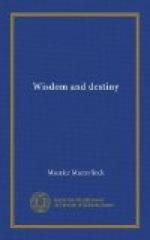Again, the knowledge that our actions still await the seal of final truth can deter from action those only who would have remained no less inert had no such knowledge been theirs. Thought that rises encourages where it disheartens. And to those of a loftier vision, prepared in advance to admire the truth that will nullify all they have done, it seems only natural still to endeavour with all might and main to enhance what yet may be termed the justice, the beauty, the reason of this our earth. They know that to penetrate deeper, to understand, to respect—all this is enhancement. Above all, they have faith in “the idea of the universe.” They are satisfied that every effort that tends to improvement approaches the secret intention of life; they are taught by the failure of their noblest endeavours, by the resistance of this mighty world, to discover anew fresh reasons for wonder, for ardour, for hope.
As you climb up a mountain towards nightfall, the trees and the houses, the steeple, the fields and the orchards, the road, and even the river, will gradually dwindle and fade, and at last disappear in the gloom that steals over the valley. But the threads of light that shine from the houses of men and pierce through the blackest of nights, these shine on undimmed. And every step that you take to the summit reveals but more lights, and more, in the hamlets asleep at your foot. For light, though so fragile, is perhaps the one thing of all that yields naught of itself as it faces immensity. Thus it is with our moral light too, when we look upon life from some slight elevation. It is well that reflection should teach us to disburden our soul of base passions; but it should not discourage, or weaken, our humblest desire for justice, for truth, and for love.
Whence comes this rule that I thus propound? Nay, I know not myself. To me it seems helpful and requisite; nor could I give reasons other than spring from the feelings alone. Such reasons, however, at times should by no means be treated too lightly. If I should ever attain a summit whence this law seemed useless to me, I would listen to the secret instinct bidding me not linger, but climb on still higher, till its usefulness should once again be clearly apparent to me.
5. This general introduction over, let us speak more particularly of the influence that wisdom can have upon destiny. And, the occasion presenting itself here, I shall do well perhaps to state now, at the very beginning, that in this book it will be vain to seek for any rigorous method. For indeed it is but composed of oft-interrupted thoughts, that entwine themselves with more or less system around two or three subjects. Its object is not to convince; there is nothing it professes to prove. Besides, in life books have by no means the importance that writers and readers claim for them. We should regard them as did a friend of mine, a man of great wisdom, who listened one day to the recital of the




